What is Rubbing Alcohol?
Rubbing alcohol is a solution made from isopropyl alcohol or ethyl alcohol mixed with water. It serves as an antiseptic for cleaning wounds and disinfecting surfaces. This colorless liquid has a sharp, musty odor and finds use in cosmetics, pharmaceuticals, and household cleaning.

According to Ashurst, J. V.’s 2023 study ‘Isopropanol Toxicity’, more than 20,000 isopropanol ingestion cases were reported to the American Association of Poison Control Centers in 2009, with over 80% classified as unintentional exposures. The data shows that approximately 80% of ingested isopropanol is absorbed within 30 minutes, and once absorbed, 80% undergoes metabolism by the liver.
Rubbing alcohol is primarily composed of 70-90% isopropyl alcohol or ethyl alcohol and 10-30% water.
Rubbing alcohol, or isopropyl alcohol, is a versatile cleaning agent commonly used for disinfecting surfaces, cleaning wounds, and removing tough stains. In addition to its primary functions as an antiseptic and surface cleaner, it also serves various other purposes, such as deodorizing, removing adhesive residue, and acting as a substitute for nail polish remover.
Safety precautions for rubbing alcohol include keeping it away from flames and heat sources, ensuring proper ventilation during use, and preventing access by children. Additionally, it is important to avoid ingestion, protect skin and eyes from contact, refrain from mixing with other chemicals, and dispose of it according to local regulations to minimize health risks and environmental impact.
Drinking rubbing alcohol is highly dangerous and potentially fatal due to its toxic concentration of ethanol or isopropanol, making it unsuitable for consumption.
The dangers of drinking rubbing alcohol are burning pain in the mouth and throat, severe organ damage, gastrointestinal issues, nausea, vomiting, seizures, coma, respiratory arrest, low blood pressure, rapid heart rate, cardiac arrest, kidney failure, liver damage, low body temperature, high blood sugar levels, muscle tissue breakdown, permanent brain damage, and death.
Treating rubbing alcohol poisoning requires immediate emergency medical attention, including calling 911 and giving milk to a conscious person to neutralize the alcohol. In the emergency room, treatment involves stabilizing vital signs, administering IV fluids, conducting tests, performing gastric lavage, and providing respiratory support, with dialysis used in severe cases.
What Are The Main Ingredients of Rubbing Alcohol?
The main ingredients of rubbing alcohol are either isopropyl alcohol (isopropanol) or ethyl alcohol (ethanol), water, and chemical additives. These solutions typically contain 70% to 99% alcohol concentration, with water making up most of the remainder. The additives enhance its antiseptic properties and render it unsafe for consumption.
What Are The Uses of Rubbing Alcohol?
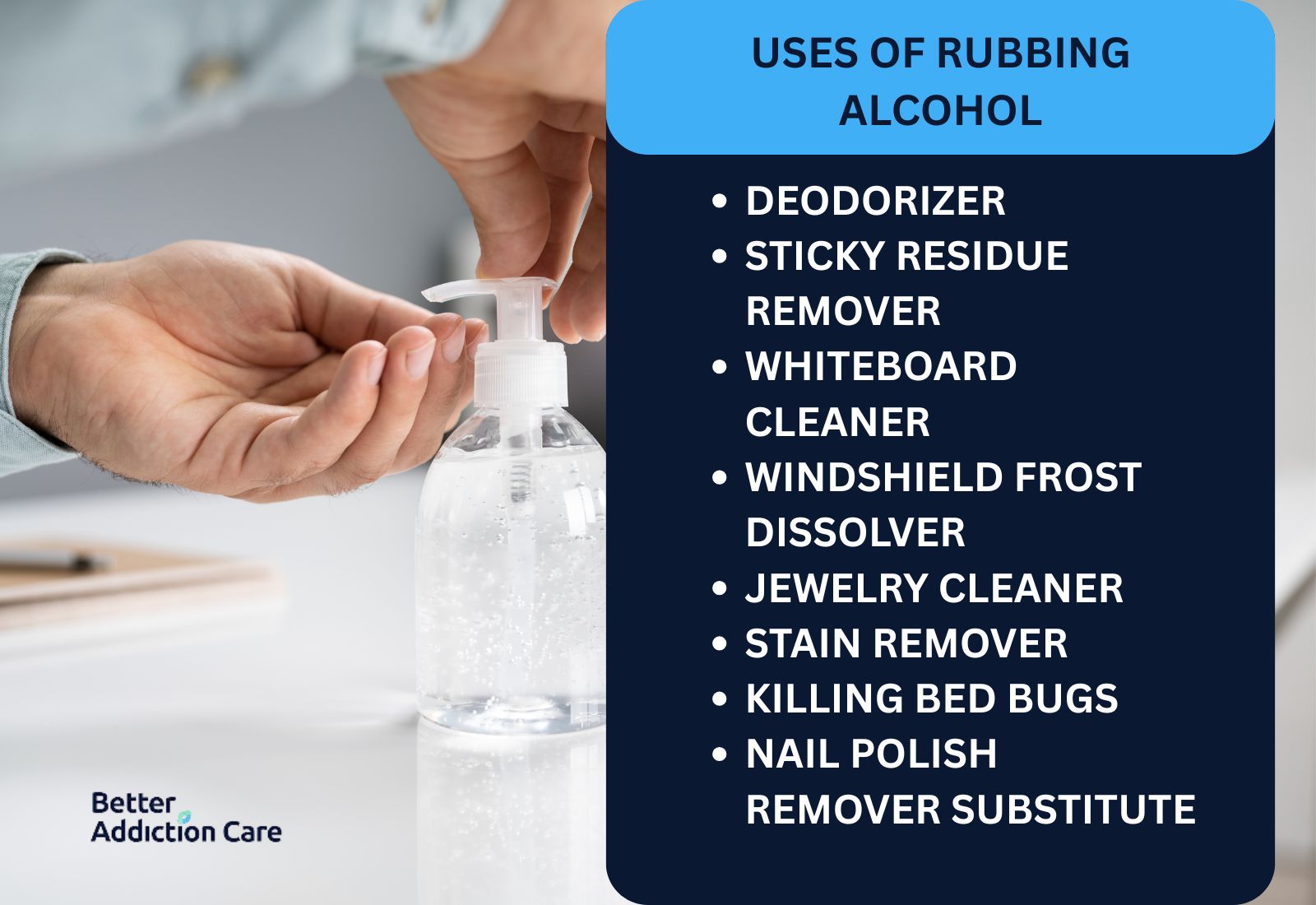
The uses of rubbing alcohol are cleaning, disinfecting surfaces, deodorizing, removing sticky residues, and serving as a medical antiseptic, making it a versatile household product. From cleaning electronics to preventing wound infections, rubbing alcohol's properties make it an excellent surface cleaner and disinfectant.
Here are the common uses of rubbing alcohol:
Cleaning and Disinfecting with Rubbing Alcohol
Rubbing alcohol, or isopropyl alcohol, serves as an effective surface cleaner and disinfectant. Its clear liquid form, commonly found in first aid kits, contains properties that make it ideal for removing stains from various surfaces, including countertops, glass, and electronics. When using it on electronics, apply it gently to avoid damage.
In medical settings, rubbing alcohol acts as a powerful antiseptic for cleaning wounds. Its ability to kill bacteria and pathogens helps prevent infections. However, applying rubbing alcohol to open wounds causes pain and irritation due to its high concentration. For sensitive areas, consider diluting it or using alternative antiseptics. Always adhere to safety guidelines for effective cleaning and disinfecting.
Other Uses of Rubbing Alcohol
Other uses of rubbing alcohol are freshening up odorous areas, removing adhesive residue, cleaning whiteboards, preventing windshield frost, brightening jewelry, eliminating tough stains, eradicating bed bug infestations, substituting for nail polish remover, and sanitizing makeup brushes.
Here are the key other uses of rubbing alcohol:
-
Deodorizer: Effectively neutralizes odors in various environments.
-
Sticky Residue Remover: Easily removes adhesive residue from surfaces.
-
Whiteboard Cleaner: Cleans and restores whiteboard surfaces for clear writing.
-
Windshield Frost Dissolver: Quickly melts frost on windshields for improved visibility.
-
Jewelry Cleaner: Safely cleans and brightens jewelry without damaging it.
-
Stain Remover: Effectively tackles tough stains on fabrics and surfaces.
-
Killing Bed Bugs: Destroys bed bugs and their eggs upon contact.
-
Nail Polish Remover Substitute: Serves as an alternative to traditional nail polish removers.
What Are The Safety Precautions And Proper Storage Methods For Rubbing Alcohol?
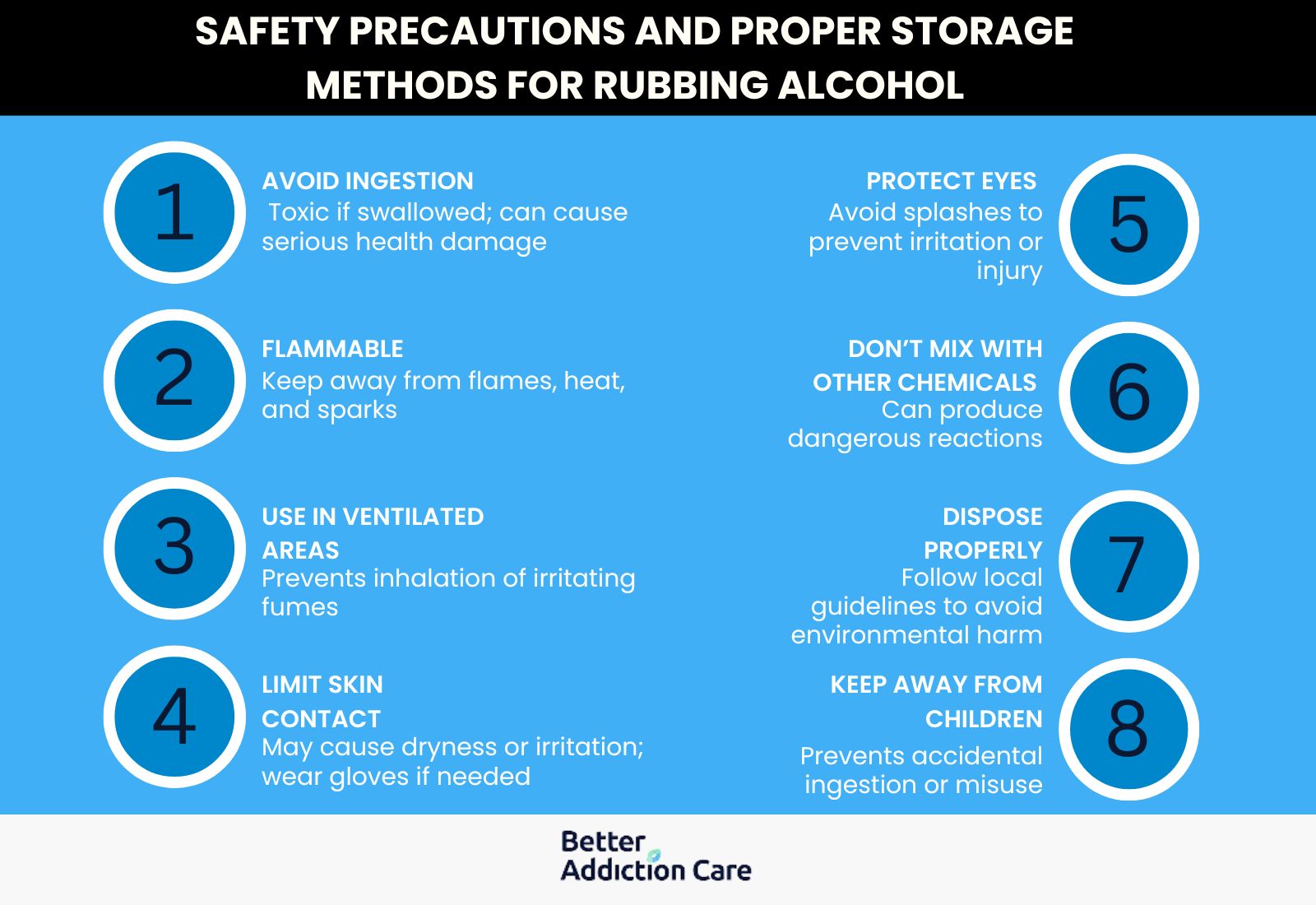
The safety precautions and proper storage methods for rubbing alcohol include keeping it away from flames or heat sources, storing it in a cool, dry place with secure caps, maintaining proper ventilation during use, and preventing access by children.
Here are some of the safety precautions and proper storage methods for rubbing alcohol:
-
Avoid Ingestion: Rubbing alcohol poses serious health risks if ingested, including poisoning and severe internal damage.
-
Flammability Awareness: Rubbing alcohol is highly flammable; keep it away from open flames, sparks, and heat sources to prevent fire hazards.
-
Ventilation: Use rubbing alcohol in areas with good ventilation to minimize inhalation of fumes, which causes respiratory irritation.
-
Direct Skin Contact: Avoid direct skin contact with rubbing alcohol, as it causes irritation and dryness; use protective gloves if necessary.
-
Eye Protection: Prevent eye contact with rubbing alcohol, as it causes irritation and damage; always handle it carefully to avoid splashes.
-
Chemical Mixing Caution: Avoid mixing rubbing alcohol with other chemical substances, as this leads to dangerous reactions and harmful fumes.
-
Appropriate Disposal: Dispose of rubbing alcohol according to local regulations, ensuring it does not contaminate water sources or harm the environment.
-
Child Safety: Keep rubbing alcohol out of reach of children to prevent accidental ingestion or misuse, ensuring a safe environment.
Can Rubbing Alcohol Go Bad or Expire?
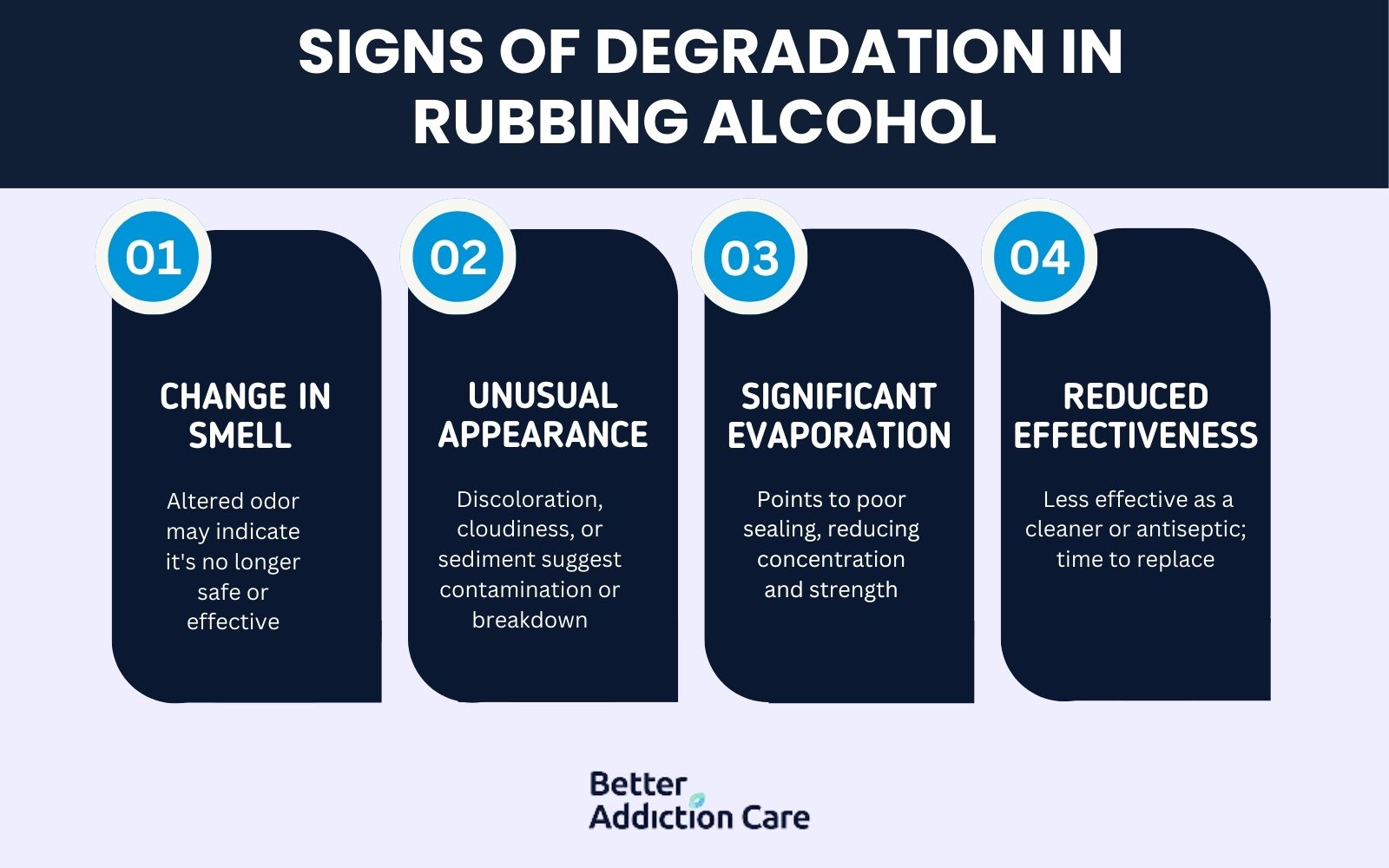
Yes, rubbing alcohol goes bad and expires. That 4-year-old bottle under your kitchen sink has already expired, as its typical shelf life is about 2 to 3 years. You'll often find the expiration date printed directly on the bottle.
To maintain rubbing alcohol's effectiveness, store it in a cool, dry place away from direct sunlight. Always ensure the cap is tightly sealed to prevent contamination and evaporation.
If proper storage guidelines haven't been followed, watch for these signs of degradation in the rubbing alcohol:
-
Changes in Smell: A noticeable alteration in odor indicates potential degradation, suggesting that the rubbing alcohol is no longer effective or safe to use.
-
Unusual Appearance: Any discoloration, cloudiness, or sediment formation in the rubbing alcohol signals possible contamination or breakdown of the substance.
-
Significant Evaporation: Excessive evaporation of rubbing alcohol points to improper sealing or storage conditions, which affect its concentration and effectiveness.
-
Reduced Effectiveness: A decline in the intended antiseptic or cleaning properties indicates that the rubbing alcohol no longer provides the desired results, necessitating replacement.
If you notice any of these signs, it's best to dispose of the old bottle and purchase a new one.
Can You Drink Rubbing Alcohol?
No, you absolutely cannot drink rubbing alcohol. It's dangerous and potentially fatal. People sometimes consider drinking rubbing alcohol during severe alcohol withdrawal when experiencing symptoms like anxiety, nausea, and tremors. The high alcohol concentration (70-99% of ethanol or isopropanol) might seem appealing to someone with alcohol addiction, as a small amount could cause significant intoxication. For perspective, a 17-ounce bottle of rubbing alcohol equals approximately 30 beers in alcohol content. However, even if some rubbing alcohol contains ethanol, the extreme concentration and additional toxic substances make it highly dangerous for human consumption and lead to serious health consequences or death.
What Are The Dangers of Drinking Rubbing Alcohol?
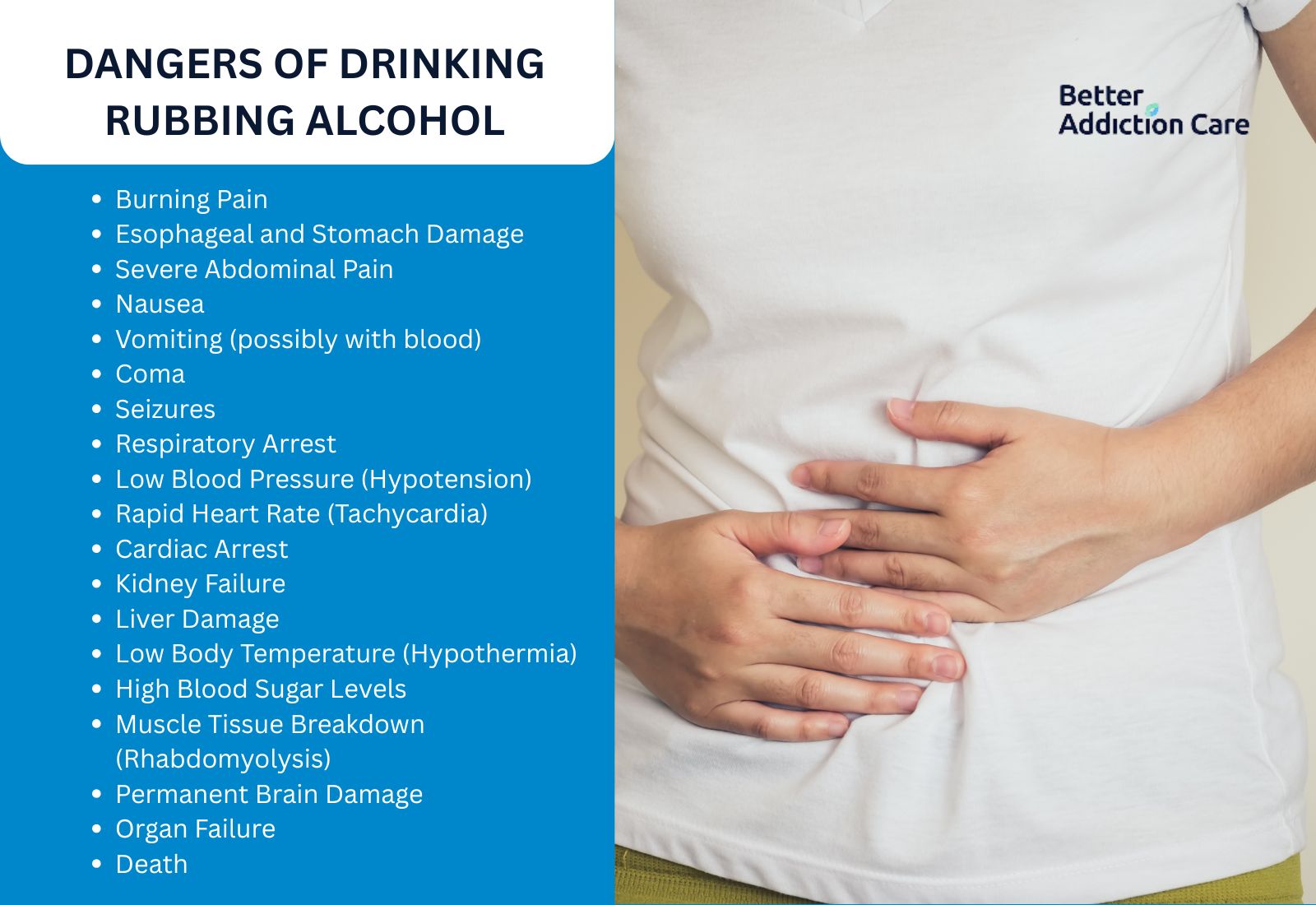
The dangers of drinking rubbing alcohol include burning pain in the mouth and throat, severe organ damage, seizures, coma, and potential death. Rubbing alcohol causes immediate irritation to the digestive tract, leads to respiratory arrest, and results in permanent brain damage.
The key dangers of drinking rubbing alcohol include:
-
Burning Pain: Consumption leads to intense burning pain in the mouth and throat, causing immediate discomfort and distress.
-
Esophageal and Stomach Damage: Rubbing alcohol irritates and damages the esophagus and stomach lining, resulting in serious gastrointestinal issues.
-
Severe Abdominal Pain: Ingestion causes severe abdominal pain, indicating significant internal injury or distress.
-
Nausea: Drinking rubbing alcohol results in nausea, contributing to a feeling of sickness and discomfort.
-
Vomiting: Vomiting, possibly with blood, occurs as the body attempts to expel the toxic substance, indicating severe irritation or injury.
-
Coma: High levels of ingestion lead to coma, a state of unresponsiveness due to central nervous system depression.
-
Seizures: Rubbing alcohol ingestion triggers seizures, reflecting severe neurological disturbance.
-
Respiratory Arrest: Ingestion depresses the respiratory system, leading to respiratory arrest and life-threatening situations.
-
Low Blood Pressure: Drinking rubbing alcohol causes hypotension, leading to dizziness and fainting.
-
Rapid Heart Rate: Ingestion results in tachycardia, increasing the risk of cardiovascular complications.
-
Cardiac Arrest: Severe toxicity from rubbing alcohol results in cardiac arrest, posing an immediate threat to life.
-
Kidney Failure: Toxic effects lead to acute kidney failure, impairing the body's ability to filter waste.
-
Liver Damage: Rubbing alcohol consumption causes significant liver damage, affecting its ability to detoxify the body.
-
Low Body Temperature: Ingestion results in hypothermia, a dangerous drop in body temperature.
-
High Blood Sugar Levels: Rubbing alcohol disrupts normal metabolic processes, leading to elevated blood sugar levels.
-
Muscle Tissue Breakdown: Consumption causes rhabdomyolysis, resulting in the breakdown of muscle tissue and potential kidney damage.
-
Permanent Brain Damage: Severe poisoning leads to irreversible brain damage, affecting cognitive and motor functions.
-
Organ Failure: Prolonged exposure to rubbing alcohol toxicity leads to multiple organ failure, threatening survival.
-
Death: Ingesting rubbing alcohol poses a significant risk of death due to its toxic effects on the body.
What Are The Symptoms of Rubbing Alcohol Overdose?
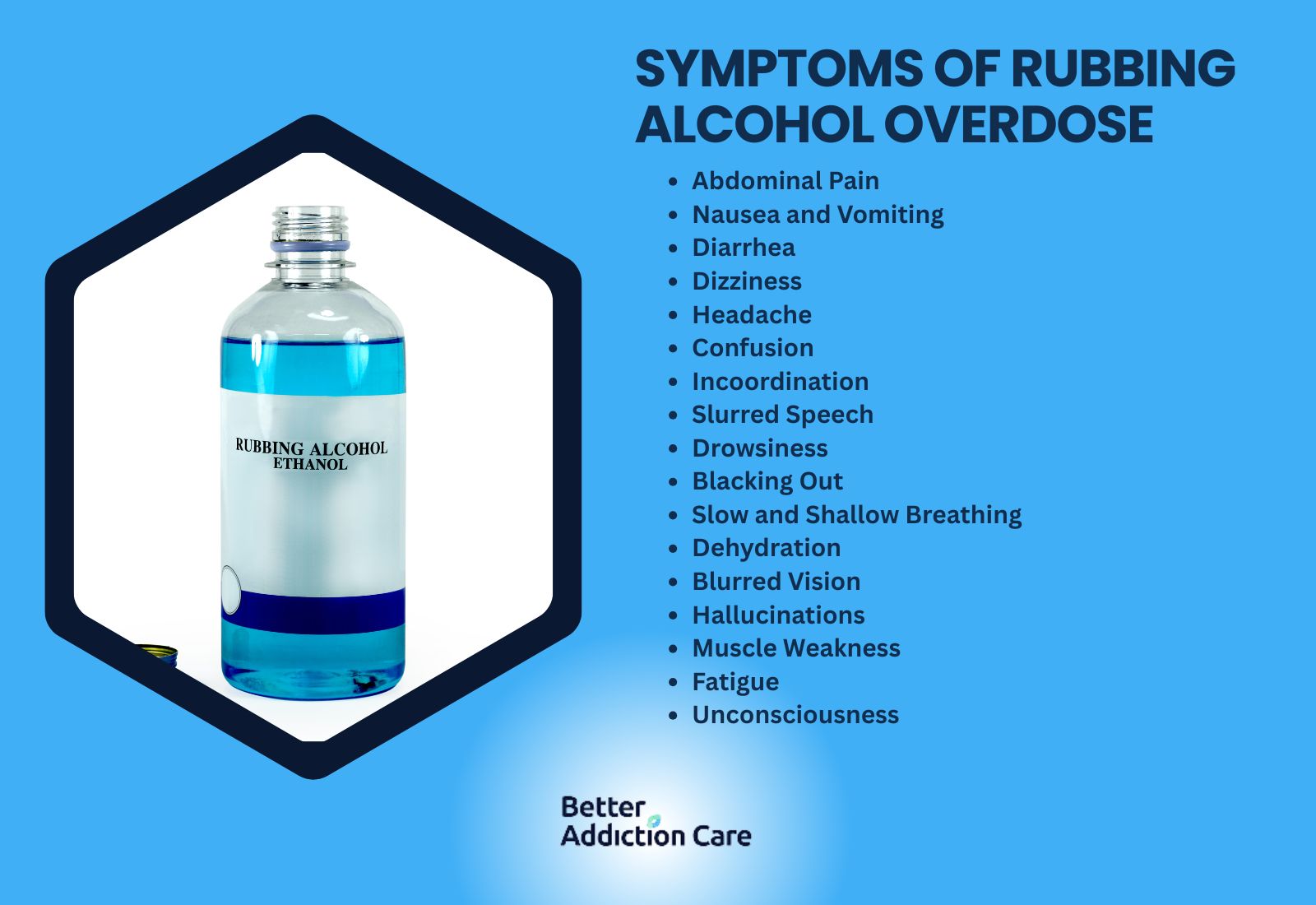
The symptoms of rubbing alcohol overdose include abdominal discomfort, digestive distress, mental confusion, impaired coordination, respiratory depression, severe dehydration, visual disturbances, and loss of consciousness.
Here are the common symptoms of rubbing alcohol overdose:
-
Abdominal Pain: Overdose results in significant abdominal pain, indicating distress in the gastrointestinal tract.
-
Nausea and Vomiting: Ingestion leads to nausea and vomiting, as the body attempts to expel the toxic substance.
-
Diarrhea: Overdose often causes diarrhea, contributing to dehydration and further gastrointestinal discomfort.
-
Dizziness: Individuals experience dizziness, affecting balance and coordination.
-
Headache: Headaches occur as a common symptom of rubbing alcohol toxicity.
-
Confusion: Overdose leads to confusion, impairing cognitive function and clarity of thought.
-
Incoordination: Individuals display incoordination, making movement difficult and unsteady.
-
Slurred Speech: Slurred speech indicates impaired motor control and neurological function.
-
Drowsiness: Overdose results in excessive drowsiness, often leading to difficulty staying awake.
-
Blacking Out: Individuals experience blackouts, losing consciousness and memory of events.
-
Slow and Shallow Breathing: Breathing becomes slow and shallow, posing a risk of respiratory distress.
-
Dehydration: Overdose contributes to dehydration, resulting from vomiting and diarrhea.
-
Blurred Vision: Visual disturbances, such as blurred vision, occur due to the effects on the nervous system.
-
Hallucinations: Some individuals experience hallucinations, reflecting severe neurological impact.
-
Muscle Weakness: Overdose results in muscle weakness, affecting overall physical strength and coordination.
-
Fatigue: Extreme fatigue develops, leading to a lack of energy and motivation.
-
Unconsciousness: Severe cases of overdose lead to unconsciousness, requiring immediate medical attention.
How To Treat Rubbing Alcohol Poisoning?
To treat rubbing alcohol poisoning, treatment options include calling 911, providing milk if conscious, administering IV fluids, performing gastric lavage, and offering respiratory or kidney support in severe cases.
If the person is conscious and able to swallow safely, provide milk to neutralize the alcohol and protect the gastrointestinal tract.
In the emergency room, healthcare professionals stabilize vital signs, conduct tests like blood work and imaging, and determine interventions based on the severity of the alcohol poisoning.
According to Slaughter, R. J.’s 2014 study, ‘Isopropanol poisoning’, the treatment of isopropanol (rubbing alcohol) poisoning primarily relies on supportive care with emphasis on respiratory and cardiovascular support. Hemodialysis is used to enhance the elimination of isopropanol and acetone, but should only be considered in severe life-threatening poisonings. With prompt supportive care, patients usually make a full recovery despite the serious symptoms of CNS depression, respiratory depression, and circulatory collapse that occur in severe cases.
Can Local Alcohol Rehab Facilities Help With Rubbing Alcohol Poisoning?
Local alcohol rehab facilities provide essential treatment for rubbing alcohol poisoning, addressing both immediate medical needs and underlying substance use issues.
Rubbing alcohol (isopropyl alcohol) poisoning requires immediate emergency medical attention before rehabilitation. Emergency departments stabilize patients suffering from this dangerous form of poisoning, which causes severe symptoms including respiratory depression, cardiac issues, and potential coma. Following medical stabilization, local alcohol rehab facilities offer comprehensive recovery programs addressing both physical healing and psychological aspects of substance misuse. These treatment centers deliver personalized care through medical supervision, counseling, and therapy designed to prevent future incidents while treating any co-occurring substance use disorders.
Professional rehabilitation programs include detoxification services, therapeutic interventions, and aftercare planning essential for full recovery from poisoning incidents. Treatment specialists work closely with patients to develop individualized recovery plans that address specific needs and circumstances surrounding rubbing alcohol consumption.
Related Articles
Treatment Centers in New Jersey
 123
123
 123
123
 123
123





